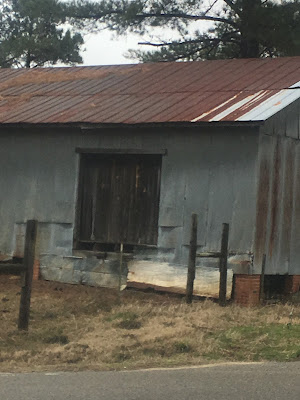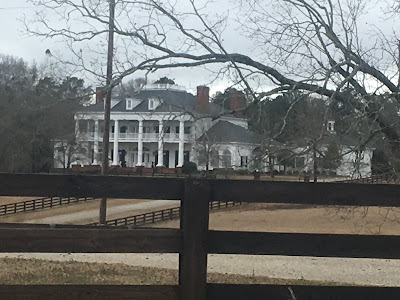 Three miles north of Claud and three miles east of Eclectic, centrally isolated in Elmore County is the small but fascinating community of Fleahop, Alabama. Unknown to most Americans, this little crossroads, this little haven of pastures, barns, and pecan trees was once the headquarters of the most dangerous criminal organization ever to have existed within the continental United States.
Three miles north of Claud and three miles east of Eclectic, centrally isolated in Elmore County is the small but fascinating community of Fleahop, Alabama. Unknown to most Americans, this little crossroads, this little haven of pastures, barns, and pecan trees was once the headquarters of the most dangerous criminal organization ever to have existed within the continental United States.I came, I saw, I studied. What follows is a story the acquisition of which put me in harm's way and exposed me to the criminal underworld of an ordinary-looking rural America that one could easily drive by without ever having a clue to its strange and sordid past. In the following narrative, some names have been changed to protect the guilty. Reader discretion is advised.
It started with an innocuous question: How did Fleahop acquire its name? There had to be a story, I figured, but I never dreamed it would take a whole afternoon and more to tell. It may sound like a tall one, but it is not. Dan and Dona Lazenby, whose kitchen table I, along with Lydia and Weldon Greer, sat at, began to talk, to tell the tale that left me shocked, stunned, stupified. Before they finished, a coffee pot had been drained, my imagination captured, and my fears stirred.
Originally the area was know as Floyd after the first whites who settled there after the Alligator/Indian Massacre at Fort Toulouse in the summer of 1714 (see in this blog "Claud, Alabama and Pashmahuna," September 5, 2016). Some say they, the three Floyd brothers, were the only survivors of the massacre, but the truth or falsity of that assertion has never been ascertained. What we do know for a fact is that they settled at a spot where a deer trail intersected an Indian trail in the wooded wilds of south-east Alabama. They camped, at first, then built log cabins, and they did alone what the whole army of that famous General Beinville couldn't: they survived the Indians. They lasted in part because they took the opposite approach of the good general. They chose the route of "If you can't beat them, join them." They assumed a non-threatening posture with the natives, and they traded-- mostly in furs-- and eventually they built a little store at the crossroads. In those early years it was called a trading post, later it would be the Floyd Store, and eventually Fleahop Store when the community was renamed in the 1920s.
Over the decades, the woods and Indians were cleared making way for cotton fields, dairy farms, and truck patches. The crossroad community grew to contain besides the store, a barber shop, a cotton gin, a church, and a community center. Once there was even a one-room school house which was built of ax-hewn beams sitting high on rock pilasters. A small herd of flea-infested goats slept under the school which also served as the location of the local Saturday night dances. During one such dance, the fleas invaded the revelry resulting in the cloggers creating a new dance they dubbed "the fleahop." The name stuck, and the area came to be known as Fleahop.
The criminal element didn't develop until the 1930s when Joe Bob Freudenheimer was released from the Wetumpka State Penitentiary where he served time for the manufacture and sale of untaxed liquor. Joe Bob, commonly known as JB, was granted his freedom just in time to experience the Great Depression and the devastation and desperation it brought down upon the land and its inhabitants like a heavy rain falling from a thunderstorm.
 |
| The Community House where the Pecan Hull Mafia met and planned their crimes. |
With his friends from prison-- Smiley Boy Simpson, Tall Tony Jones, and Joey Bag of Beans Smith-- JB assembled a small cadre of rough men who had skills in breaking and entering, in falsification of documents, in the manufacture of likker. They began to break into banks not to steal money, but to change the wording on land deeds. Over a couple of years, JB "acquired" the pecan rights to all the land in Elmore County. When anyone challenged JB's rights, he was met with a wedgie, a black eye, and a bullet hole in his car or pickup truck.
After that, after taking over Elmore County, the Pecan Hull Gang, as they came to be known, realized that pecans were not enough to fulfill the huge desire JB had for cash, and despite having spent time in the pen for untaxed likker, he bought an old building from the gin and began to make moonshine right on the side of Fleahop Road. Apparently he was in cahoots with the sheriff because calls to the law never led to an arrest. What they did lead to was a visit from JB's enforcers who would apply a wedgie, and black eye, and a bullet hole into the caller's car or truck. Soon, people learned to turn a blind eye and not even bother with the sheriff.
 |
| The building where JB made his moonshine. |
JB's control became so complete that people in neighboring counties began to call the inhabitants of Elmore County "Elmorons" for letting a loser like JB take over their county. Soon, however, they saw his power when he acquired all the pecan rights in their counties as well. Not only that, but JB and his gang started putting all the other moonshiners out of business. If the sheriff didn't bust them, the JB boys would. Anyone caught making likker was administered a wedgie, a black eye and a bullet hole in his car or truck.
When it looked like JB couldn't grow any more fierce or powerful, he did. He began to grow and sell marijuana, but not just any sort of weed. He had a proprietary blend of rabbit's tobacco and marijuana laced with moonshine.
Despite his legendary wealth, JB and his associates, lived in old trailer homes, dressed in ragged overalls, and drove old beat-up pickup trucks. To launder his money, JB purchased another building from the gin and began a fly-tying business. He created beautiful fishing flies which he boxed and shipped to neighboring towns. Then one of his gang would drive to the town and get the box from the post office and then send back a money order for the flies. In that way, his fly-tying business brought in more and more money each year, eventually amounting to hundreds of thousands of dollars annually. Within months, he was hiring bag men to receive money wired though Western Union, pick up the box of flies at the post office, and mail back a money order. Yes, occasionally, someone ripped off JB. But they were always paid a visit by one of JB's men who administered a wedgie, a black eye, and a bullet hole to the offender's car. It didn't take long for people to learn, you didn't double cross JB and the Pecan Hull Mafia as they were eventually called.
 |
| This once housed JB's Fly Tying Operation. |
They met in the Fleahop Community Center where they played dominoes, listened to country music, and drank coffee. There they plotted and planned, and whatever they plotted and planned, they eventually executed (pun intended). It seemed nothing could touch them. The sheriff made a visit to the Community House a couple of times per week. He never left with anyone in handcuffs, instead he stayed a while and left alone with a smile on his face.
Their enterprise was so lucrative that in the 1970s, the Chicago Mob came down and tried to take them over. They failed and instead left with wedgies, black eyes, and bullet holes in their cars. In the early 1980s, the New York Mob came down and tried to take them over. You got it: they left with wedgies, black eyes, and bullet holes in their cars. The Alabama Bureau of Investigation tried to stop them. They left with wedgies, black eyes, and bullet holes in their cars. Even the FBI tried and met the same fate.
 |
| Junior's mansion was the beginning of the end of the Pecan Hull Mafia. |
JB passed away in 2001. The old gang either died or were confined to nursing homes where they sat around and talked about the old days and one of them tried to start a dessert scam where he collected and sold uneaten desserts to the other old geezers and even the employees. JB's son was soon seen hanging out at the Community House. A whole new generation took over the Pecan Hull Mafia. Unlike their predecessors, the younger generation dressed well, drove fancy cars, and Joe Junior, with no job and no visible means of support, built a replica of Tara only bigger and more elaborate. Inside, the water fixtures were made of ten carrot gold. Then the IRS working in conjunction with the FBI did what no one had been able to do. They busted the whole gang in 2004. Joe Junior was charged with tax evasion, and twelve counts of conspiracy for everything from the sale of illegal liquor, to wedgies, black eyes, and assaults on automobiles. And just like that, they were gone.
Nobody believed it would really happen until they heard the guilty verdicts and saw Joe Junior led out of the courtroom in handcuffs. An era had passed. The inhabitants of Fleahop danced in the streets, literally. Dan Lazenby stumped his big toe while dancing in the road and was laid up for a week. But they say a smile never left his face while his lovely bride, Donna, cooked him pecan pies and spoon fed him to an additional thirty pounds.
Today the gang is gone. The land lies quiet. The citizens now eat pecans in their yards and grin while doing it. But some residents claim the local mob is still going strong, bigger and better than ever. They have just changed tactics and operate out of sight. Me myself, I don't know. I was only there for a few days and this is all I could find out. If you have further questions, contact Weldon Greer or Dan Lazenby. On second thought, don't talk to them because I promised not to use their names when I wrote this up. Do your own research instead, and then let me know what you find out.
Zane, This was a good read. Thank you.
ReplyDeleteGreat story!
ReplyDeleteMy family the Floyds
ReplyDeleteIt corroborates earlier suspicions.
ReplyDeleteTks.
Tell you how much I enjoyed the story it's a wonder a movie has been made out of this it would have been so good
ReplyDeleteTHEY ARE STILL THERE I HAVE IT ON GOOD AUTHIRITY THEY ARE TRYING TO CORNER THE FIG MARKET I AVOID THAT AREA EVEN GO ALL THE WAY THROUGH CHANEY CREEK TO GET TO TOWN. THEM DOMINO GAMES ARE REALLY PLANNING MEETINGS,ITS PLUM SCANDIOUS
ReplyDelete